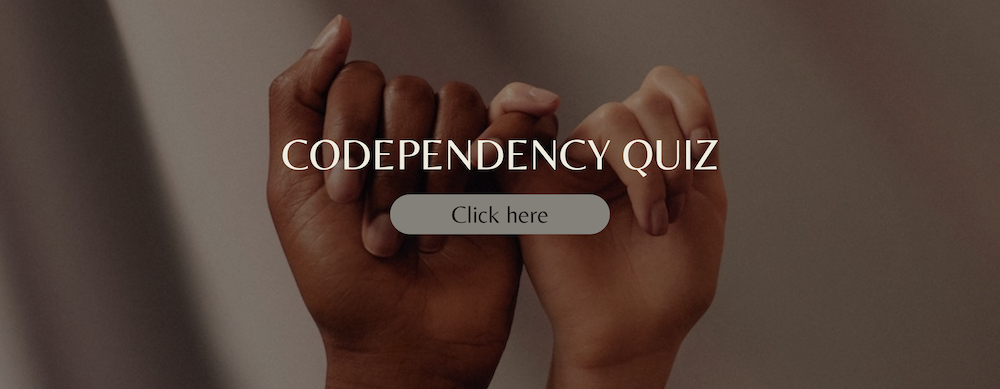Caring vs Codependent Behaviour
Feb 26, 2023
Women are givers.
In society, women have been celebrated as being the caregivers. The house wife role, the mother, the nurturer… so in many ways, the patriarchy has pushed us towards being the caring beings that we so often are. However there is a very fine line between being caring and loving… and being codependent. In this blog we are going to explore this & the signs of a codependent relationship.
Codependency comes from a good place.
Please know that I was once incredibly codependent and in fact I would call myself a recovering codependent! Codependency often comes from a really good place - being an empath, being sensitive, wanting to help, loving deeply, feeling the need to heal others. (It’s no wonder that so many codependent people go into job roles that also allow us to heal / nurture others.). Your heart is often in the right place and the likelihood is, if this is all very new to you, all your behaviours and actions are totally subconscious. They are most likely learned behaviours & the wonderful thing is these learned behaviours can be changed. This work is about bringing that subconscious mind into the conscious mind so we can execute some changes to make life feel a whole lot better & help improve your mental health. Your relationships can all change - not just a romantic relationship but your relationships with your colleagues, family, friends & loved ones!

The thing is, we have to take a step back and see where these codependent behaviours (that we see as loving and caring) come from. As I mentioned in my blog “Am I codependent” some of the common traits of codependency are: people pleasing, saying yes when you mean no, sacrificing your needs to take care of others, feeling guilty if we let others down, wanting the approval of others, not wanting to make decisions on your own, feeling responsible for other people’s feelings… the list goes on!
With codependency these behaviours are most likely coming from a lack within us. They are coming from a place of not feeling worthy ourselves. They come from not being able to validate our selves and our own needs. They come from a place of not being able to ask for our needs to be met by others for fear of rejection or abandonment. They come from not seeing how valuable and worthy we are just as we are - we feel we have to do so much for others, and do it perfectly, in order to be loved.
Something that is really important to note here is that healing from codependency doesn’t mean total independence! We are wired to belong, we are wired to seek out other people and be close to them. When we are in healthy relationships we aren’t afraid of being “too much” or “too needy” or of stating our specific needs. The likelihood is, when you are codependent, firstly you are unsure of what your needs are and secondly you feel afraid to speak them. You are someone who most likely has sacrificed their needs for a long time in order to take care of others. There is a sense often of feeling like you need to earn love and therefore have to be the person who can be there for all of those around you.

3 signs you may be tipping the scales of codependency:
You have unhealthy boundaries.
You never say no when you want to. It makes you feel guilty. You don’t just have unhealthy boundaries with others but also with yourself. For example, you know the things that will help you feel good - exercise, a walk in nature, 10 minutes of journaling, therapy - but you tell yourself you don’t have time (or perhaps the money). You instead either focus on others or you focus on being productive because it’s a way for you to (deep down) prove your worth. Remember all of this is subconsciously happening right now!
Wanting a partner to predict your feelings.
You wish your partner could just tell when they need to step up for you. Picture this: you are clearly tired, you have had a tough week, you just wish your partner would cook you a simple dinner. You feel grumpy when she/he comes home and they sit down to watch TV. Why haven’t they figured out that YOU need looking after for once?! We expect others to meet our needs without simply asking and being honest about how we feel straight up. This leads to more upset and potentially a fight causing you to feel like “He/she just doesn’t get me.”
You take care of others first.
A codependent person will always busy themselves with other things that need to be done, other people that need to be looked after. People who are in healthy relationships to themselves as well as others have clear boundaries which will include looking after their own needs first. They know their values, they know what’s important to them, they know what allows them to be the best possible versions of themselves. They rarely abandon themselves for others. They have non-negotiables and stick to them.
Ultimately being caring, loving & compassionate promotes honesty & direct communication in any type of relationship. Codependency promotes covert or overt manipulation (even though you might have the best intentions), passive aggression & a lack of authenticity. The underlying motive for being caring is to support and offer love. The underlying motives of codependency, is that of self-preservation. When we are codependent we are motivated by fear - we are in need of love & safety & the acceptance of others. A caring and loving person is not seeking the acceptance of others as they already feel accepted by themselves and by others.
How can I move from Codependent to Caring & Loving?
Well the first step is to take my free codependency quiz which will not only help you decipher whether you are codependent, but will also help you understand more about how you can break free from codependency & start to engage in healthier, more honest relationships.
SIGN UP TO SELF-WORTH WEEKLY
Join our newsletter to receive self-worth tips, direct answers to your questions, personal stories, yoga classes, meditations and much more.
Your information will not be shared & you can unsubscribe at any time.







